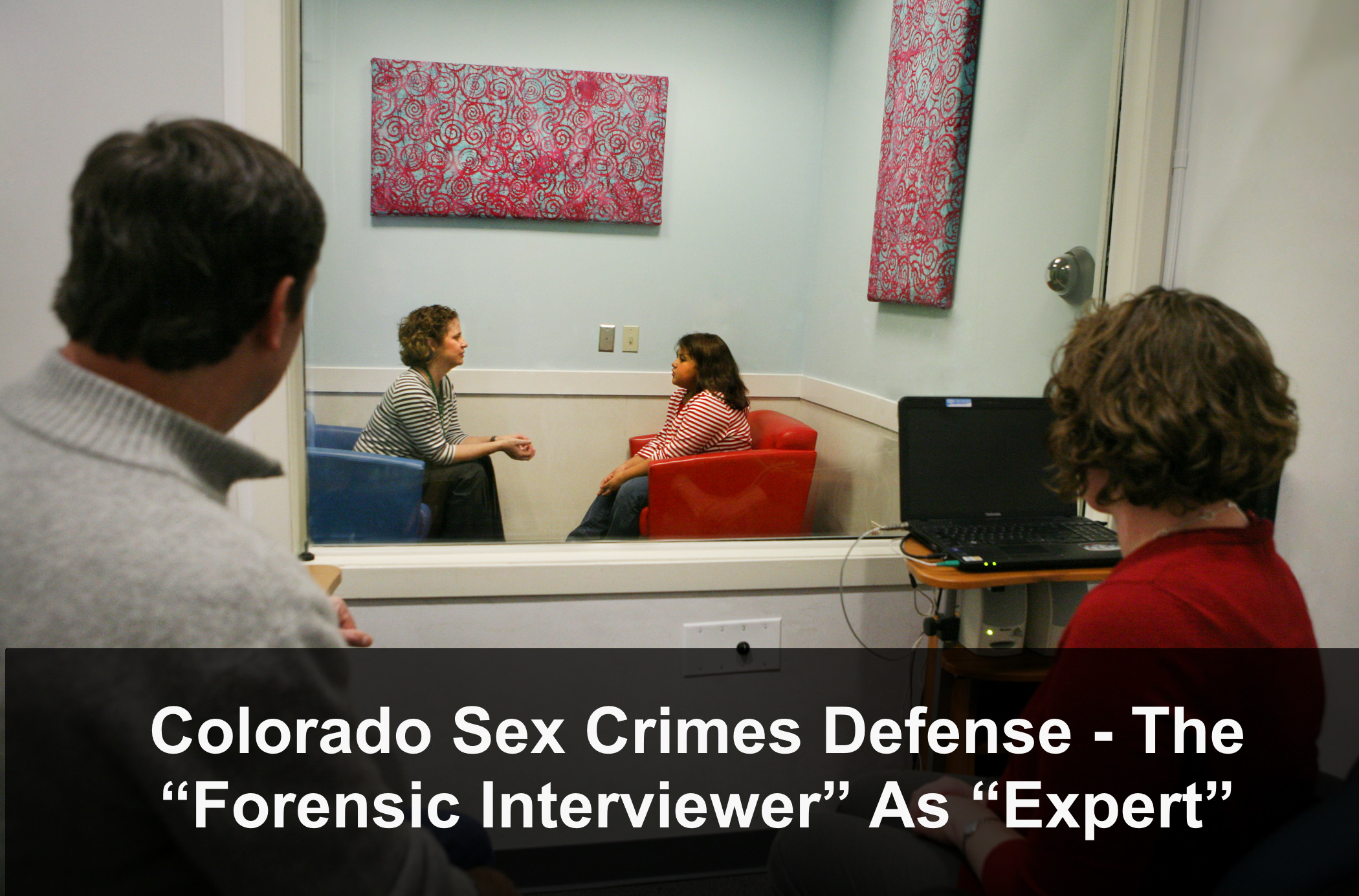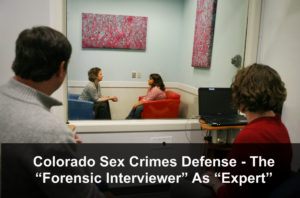




Colorado Sex Crimes Defense – The “Forensic Interviewer” As “Expert”
By H. Michael Steinberg Colorado Sex Crimes Criminal Defense Lawyer – Attorney
Colorado Sex Crimes Defense – The “Forensic Interviewer” As “Expert” – Many Colorado child abuse related crimes begin with a complaint to the police followed by an investigation lead by a forensic interview of the alleged victim child.
This article addresses limits on the admission of the trial or other courtroom testimony of the “forensic interviewer.”
The Forensic Interviewer – A Key Role In The Colorado Child Abuse Criminal Justice System
The testimony of a “forensic interviewer” in a Colorado Sex Crimes Trial, if not controlled carefully, can possibly be harmful to the defense case. The “line” between when this potentially harmful witness is testifying as a lay witness and when she or he is testifying as an expert can sometimes be blurred by Colorado Trial Judges if the criminal defense lawyer is not vigilant.
The law however is clear. It is an abuse of a Trial Judge’s authority to permit a witness to give expert testimony when they have not been qualified as and expert and are called to testify at trial ONLY as a lay witness.
A so called “forensic investigator’ evaluates children who are alleged to have been abused. That interview is then followed by a “collaboration” with others assigned to the case, such as the police and child protective services, to try to determine what, if anything, actually happened to the child.
This “process” ends up with key recommendations regarding criminal prosecution or even as to child custody, placement, treatment or even a termination of parental rights.
It is well known that children are subject to influence by adults. The nature and extent of that influence can include such things as:
- Being told what to say;
- Being questioned in a way that alters their recollection of the events;
- Being given information that changes or otherwise distorts the child’s memory to include a recounting of a events that is heavily influenced by the suggested information or misinformation.
The Law – When Does The Forensic Interview “Cross The Line” Into Expert Testimony?
While some of a forensic interviewer’s testimony may be admissible as lay opinion – some of that testimony may not be sheltered within that broad category. Colorado criminal defense lawyers should object to testimony that is offered as lay witness testimony when it is in fact inadmissible expert testimony represented “in the guise of lay opinion.”
In determining whether forensic evidence testimony is “lay testimony” under Colorado Rule of Evidence (“CRE”) 701, or “expert testimony” under CRE 702, a Trial Judge is required to look to the basis for the opinion.
If the witness provides testimony that could be expected to be based on an ordinary person’s experiences or knowledge, then the witness is offering lay testimony.
But even more importantly…
if a witness provides testimony that cannot be offered without specialized experiences, knowledge, or training, then the witness is offering expert testimony.
The Analysis – By The Steps – A Closer Look At Colorado Rules Of Evidence 701 and 7702 – When Testimony Is Expert Testimony
As noted above – to determine whether testimony is lay testimony under CRE 701 or expert testimony under CRE 702, the trial court must look to the basis for the opinion.
If the witness provides testimony that could be expected to be based on an ordinary person’s experiences or knowledge, then the witness is offering lay testimony.
If, on the other hand, the witness provides testimony that could not be offered without specialized experiences, knowledge, or training, then the witness is offering expert testimony.
Whether a witness’s testimony is lay or expert depends on the facts and surrounding circumstances of the case. This requires the Trial Judge to perform the analysis on what is known as a “case-by-case analysis of both the witness and the witness’s opinion.”
The Colorado Rules of Evidence (CRE) Provides The Rules That Govern The Analysis
Rules CRE 701 and 702 distinguish lay testimony from expert testimony.
CRE 701 Defines the Scope Of Lay Witness Opinion Testimony.
It provides that lay witness testimony in the form of opinions or inferences must be:
(a) rationally based on the perception of the witness,
(b) helpful to a clear understanding of the witness'[s] testimony or the determination of a fact in issue, and
(c) not based on scientific, technical, or other specialized knowledge within the scope of [CRE] 702.”
CRE 702 Addresses The Admissibility Of Expert Testimony.
Under this rule, expert testimony is defined as follows:
“[i]f scientific, technical, or other specialized knowledge will assist the trier of fact to understand the evidence or to determine a fact in issue, a witness qualified as an expert by knowledge, skill, experience, training, or education, may testify thereto in the form of an opinion or otherwise.” CRE 702.
A Good Example – When Lay Testimony Becomes Expert Testimony
When the District Attorney attempts to present expert testimony in the “guise” of lay testimony – it can have a heavy impact on the State’s case. For example, in a Colorado Vehicular Homicide case if a police officer testifies about his training in investigating and reconstructing traffic accidents, his observations and reconstruction of the crime scene at issue in the case, and the factual inferences of fault for the causation of the accident – he or she – has crossed the line into expert testimony.
In this instance, a police officer’s testimony about his observations of the crime scene and his investigation of the incident are admissible as lay opinion testimony, deductions about vehicle’s direction, position, and speed during the accident require “specialized training and knowledge” and are therefore expert testimony.
Another Example – Explaining To A Jury Why A Child May Delay Reporting Alleged Child Abuse
In a Colorado Child Abuse case, when a witness testifies about a child’s “delayed disclosure” of abuse, inconsistent statements about abuse, and even a recantation of an accusation of abuse, ANY testimony attempting to explain these behaviors would require a foundation of specialized expertise in child psychology. Such testimony would be improper because “an ordinary person, for example, would not know that children commonly delay disclosing abuse.”
Expert testimony goes beyond the realm of common experience and requires experience, skills, or knowledge that the ordinary person would not have.
Summary And Conclusion – Colorado Sex Crimes Defense – The “Forensic Interviewer” As “Expert”
In determining whether testimony is lay testimony under CRE 701 or expert testimony under CRE 702, the trial court must look to the basis for the opinion.
If the witness provides testimony that could be expected to be based on an ordinary person’s experiences or knowledge, then the witness is offering lay testimony.
If, on the other hand, the witness provides testimony that could not be offered without specialized experiences, knowledge, or training, then the witness is offering expert testimony.
When A Forensic Interviewer Becomes An Expert In Child Psychology
A forensic interviewer’s statements about her training, experience, and techniques conducting forensic interviews constituted expert testimony which might include the interviewer’s:
- testimony describing her professional background,
- the number of interviews she has conducted and
- the number of times she has testified in court,
- how she conducts an interview with a child victim,
- how she builds rapport with the child,
- tests the child’s memory,
- directs the child to answer questions honestly,
- and usually asks open-ended, not leading, questions.
… would not is not expert testimony because any ordinary person is capable of describing her own credentials. Essentially a “general description of the protocol” that the forensic interviewer uses when interviewing child victims does not require specialized knowledge.
BUT, a forensic interviewer, “crosses the line” into expert testimony when the interviewer references, for example, the concept of “reproduction – otherwise known as the habit of children to gesture with their hands to demonstrate where on their bodies they were touched.
Or, a forensic interviewer’s discussion of “core versus peripheral” details that includes an opinion of “the relative importance of each type of detail in determining the truth of an allegation and categorized several of the details to which the children testified as either core or peripheral” is the kind of “specialized knowledge” that is the subject of expert testimony, that “an ordinary person would not recognize.”
Colorado Sex Crimes Defense -The “Forensic Interviewer” As “Expert”
If you found any of the information I have provided on this web page article helpful please click my Plus+1 or the Share buttons for Twitter and Facebook below so that others may also find it.
The reader is admonished that Colorado criminal law, like criminal law in every state and at the Federal level, changes constantly. The article appearing above was accurate at the time it was drafted but it cannot account for changes occurring after it was uploaded.
If, after reading this article, you have questions about your case and would like to consider retaining our law firm, we invite you to contact us at the Steinberg Colorado Criminal Defense Law Firm – 303-627-7777.
Never stop fighting – never stop believing in yourself and your right to due process of law. You will not be alone in court, H. Michael will be at your side every step of the way – advocating for justice and the best possible result in your case. H. Michael Steinberg is passionate about criminal defense. His extensive knowledge and experience of Colorado Criminal Law gives him the edge you need to properly handle your case
 ABOUT THE AUTHOR: H. Michael Steinberg – Email The Author at:
ABOUT THE AUTHOR: H. Michael Steinberg – Email The Author at:
A Denver Colorado Criminal Defense Lawyer – or call his office at 303-627-7777 during business hours – or call his cell if you cannot wait and need his immediate assistance – please call 720-220-2277.
“A good criminal defense lawyer is someone who devotes themselves to their client’s case from beginning to end, always realizing that this case is the most important thing in that client’s life.”
You should be careful to make a responsible choice in selecting a Colorado Criminal Defense Lawyer. We encourage you to “vet” our firm. Over the last 40 plus years – by focusing ONLY on Colorado criminal law – H. Michael has had the necessary time to commit to the task of constantly updating himself on nearly every area of criminal law, to include Colorado criminal law and procedure and trial and courtroom practice.
Putting more than 40 years of Colorado criminal defense experience to work for you.
H. Michael works hard to get his clients the best possible results in and out of the courtroom. He has written, and continues to write, extensively on Colorado criminal law and he hopes this article helps you in some small way – Colorado Sex Crimes Defense – The “Forensic Interviewer” As “Expert.”

Other Articles of Interest:
- Colorado Criminal Defense Law: Initial Stages In Child Sex Crime Investigations
- Under Colorado Law – Can I Force the Alleged Victim of a Sexual Assault To Take a Polygraph? 18-3-407.5
- False Charges Of Sexual Assault On A Child – Common In Colorado Domestic Cases Part II of II
- Colorado Criminal Sex Crimes Forensics: A Typical DNA Analysis in a Sexual Assault Case
- Designing A Strategy to Defend Against False Allegations of Child Sexual Assault – The Basics













